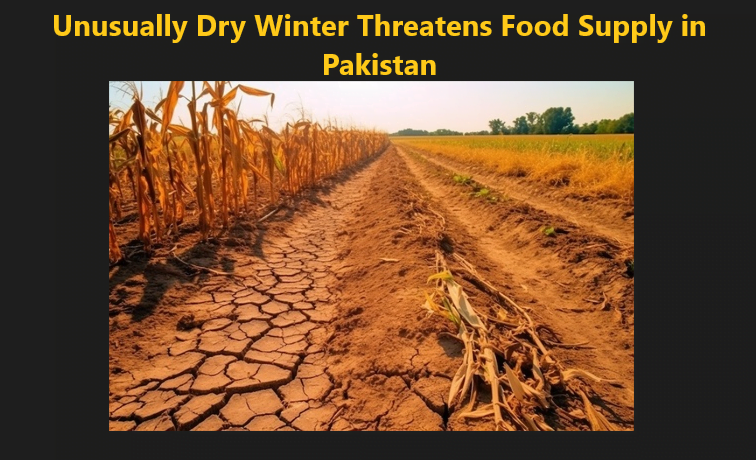Unusually Dry Winter Threatens Food Supply in Pakistan.
Pakistan’s Farmers Face Double Whammy: Drought After Floods Threatens Food Security
Double trouble for Pakistan’s farmers: After reeling from devastating floods in 2022, another blow strikes – alarmingly dry winter threatens the upcoming harvest.
Read More: Siestas to Deal With Scorching Heat Weather
- Little rain falls in 3 months: Fears rise as farmers miss agricultural targets and crops wither.
- Fareeda Nasrullah, a Balochistan farmer, worries about her wheat crop.
- Floods depleted water: “We have water pumps, but the table is too low,” she says.
- Harvest fears: Nasrullah expects only 25% of her usual yield, putting livelihoods and food security at risk.
This desperate situation demands urgent action:
- Support farmers: Provide resources and irrigation solutions.
- Invest in climate-resilient agriculture: Adapt to changing weather patterns.
- Ensure food security: Collaborate to avoid a major crisis.
Drought Looms: Pakistan’s Farmers Brace for Below-Average Harvest
The rain gods haven’t smiled on Pakistan this winter:
- 90% less December rainfall than usual, raising alarm bells for farmers.
- Unseasonably warm weather further exacerbates the situation.
- Experts warn of changing weather patterns, with more frequent extremes replacing “normal” seasons.
- Mountain snow levels also alarmingly low, impacting water reserves.
Consequences for agriculture:
- Delayed seed germination, stunted growth, and disrupted development threaten wheat, gram, lentils, and barley crops.
- Reservoirs likely to remain low throughout the summer, impacting irrigation for rice, maize, millet, and sugarcane.
- Food security expert Omer Bangash warns of increased burden on arid regions.
This double whammy of less rain and changing weather patterns puts Pakistan’s food security at risk. Urgent action is needed to:
- Support farmers with resources and drought-resistant solutions.
- Invest in climate-resilient agriculture to adapt to changing weather patterns.
- Ensure food security for the nation through collaboration and proactive measures.
Pakistan’s winter woes deepen:
- Scarce rainfall in October-December, likely to continue through March, especially in arid regions like Balochistan and Khyber Pakhtunkhwa.
- Food security expert Omer Bangash warns: not only will rabi crops suffer, but kharif crops in summer will also lack water.
- Arid and humid zones most vulnerable: already facing food insecurity and malnutrition, they could see the situation worsen.
- Wheat production targets likely missed, potentially necessitating imports.
The government remains cautious:
- Mujeeb Ur Rehman from the food security ministry acknowledges rainfall impact on yields, but avoids definitive forecasts before harvest.
This alarming situation demands immediate action:
- Support farmers in arid regions with drought-resistant solutions.
- Invest in climate-resilient agriculture to adapt to changing weather patterns.
- Ensure food security through strategic planning and collaboration.
Climate Change Blamed as Drought Grips Pakistan: Experts Warn of Worsening Food Crisis
The lack of rain and snowfall this winter in Pakistan isn’t just bad luck – it’s a grim symptom of climate change, experts warn.
- Shafqat Munir, climate expert: “Pakistan is particularly vulnerable to climate disasters like floods and droughts, and now we see both extremes happening within a year.”
- 2022 floods followed by 2023 drought: El Nino and local factors contributed, but climate change is the underlying cause.
- Dry spells becoming more frequent and severe: This threatens future crops with water shortages and heatwaves.
- Food security at risk: “If dry spells continue, Pakistan may struggle to feed its population in the future,” warns Munir.
This alarming situation demands urgent action:
- Invest in climate-resilient agriculture: Adapt to changing weather patterns and protect food production.
- Reduce greenhouse gas emissions: Tackle the root cause of climate change globally.
- Support and empower local communities: Help them build resilience to extreme weather events.
Let’s act now to secure Pakistan’s future and safeguard its food security for generations to come!
Note: The information above might not be accepted 100%. Please verify from your own sources. We will not be responsible for any kind of loss due to our content.
For more news, please visit Munafa Marketing.




